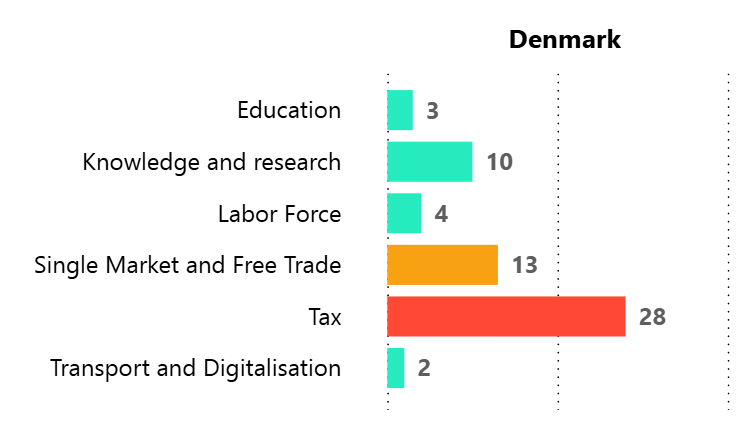
Competitiveness Barometer
THE BUSINESS ENVIRONMENT | THE DANISH CHAMBER OF COMMERCE

The bars indicate Denmark’s ranking among 35 OECD countries. Green represents a position in the top third, yellow the middle third, and red the bottom third compared to other countries for each indicator. Explore the data at the top of the page.
A World of Increasing Competition
We live in an era of ever-increasing global competition.
If new investments, new businesses, and new employees are to keep choosing Denmark — and not elsewhere — it is essential that our companies’ framework conditions remain at least on par with, or better than, those in the best-performing countries worldwide.
Otherwise, over time, our prosperity and welfare will suffer.
Therefore, the Danish Chamber of Commerce has updated our Competitiveness Barometer — the Danish Chamber of Commerce’s Competitiveness Barometer — which takes the temperature of Danish business conditions and competitiveness on more than 50 indicators, comparing Denmark to as many OECD countries as possible. The barometer can be found at the top of the page.
We assess whether Denmark is leading or lagging behind when compared to other mainly wealthy OECD countries across various framework conditions.
The Framework Conditions Benchmarked Internationally Are:
- Education
- Labour force
- Knowledge and research
- Taxation
- Transport and digitalisation
- Internal market and free trade
In 2024, Denmark ranks fourth overall on the Danish Chamber of Commerce’s Competitiveness Barometer among 35 OECD countries. This is four positions higher than last year, when Denmark ranked eighth, thanks to surpassing countries such as Sweden, the Netherlands, and Finland.
Denmark ranks among the top four OECD countries for favourable labour force conditions and top three for education.
In transport and digitalisation, Denmark is only surpassed by Switzerland. However, Denmark performs poorly in taxation, ranking 28th — though this is an improvement from 29th last year.
Denmark has improved in several areas: labour force, taxation, education, and knowledge and research. Within the internal market and free trade, Denmark has dropped one place, while maintaining its second-place position in transport and digitalisation. This means Denmark’s fourth-place overall ranking this year stems from outperforming many OECD peers in most framework areas, without significant declines elsewhere.
International Comparison
Switzerland maintains first place, also topping transport and digitalisation. It ranks second in education and third in both labour force and knowledge and research.
Among the countries Denmark has overtaken since last year is the Netherlands — a country similar to Denmark in economic structure and business environment. The Netherlands now ranks seventh, two places lower than last year. It performs particularly well in labour force conditions and internal market and free trade, but shares Denmark’s low ranking in taxation. Additionally, the Netherlands ranks 15th in knowledge and research.
Sweden and Finland rank sixth and ninth, respectively. Finland has fallen three places, declining in nearly all areas except knowledge and research, where it improved from ninth to sixth. Sweden, on the other hand, improved across all areas except transport and digitalisation and knowledge and research, where it maintained its positions.
Continuous Progress
All countries are constantly working to improve their business conditions. A strong position today therefore does not mean one can rest on their laurels.
Explore the Competitiveness Barometer at the top of the page ⇑
Kontakt
Do you have any questions?

Analyse
Kasper Lindgaard
Chef for analyse og samfundsøkonomi